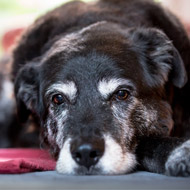Home checklist to help dogs with arthritis

The checklist covers everything from floor surfaces and stairs to getting on and off the sofa with ease.
A simple checklist for owners, occupational therapists and veterinary nurses to use when adapting the home for a dog with arthritis has been published by Canine Arthritis Management (CAM).
Based on a well-respected human screening tool, The Home Assessment Checklist can be used to consider what features in the home might be adapted, to reduce the impact of arthritis on an individual dog’s function.
The checklist covers everything from floor surfaces and stairs to getting on and off the sofa with ease. It also includes items on external pathways and making sure that dogs can get in and out cars without additional help.
The guide has been compiled with the help of CAM’s Facebook followers, who submitted information on personal experience. From the responses, the author designed 17 questions that focus on day-to-day activities that are closely linked to the home environment.
Writing on its website, CAM said that it intends to trial the tool, and then use a panel of experts to refine it. It is hoped that the final tool will contribute to assisting the multimodal management of canine arthritis.
‘Pet owners are increasingly looking for ways to assist their pet to achieve a better quality of life into older age,’ writes CAM. ‘Like humans, living into old age often means living with long-term conditions, such as arthritis, that have a profound effect on mobility and comfort.
‘CAM has recognised that there is a lot that the enlightened owner can do to reduce the cumulative effects of activities that are thought to compound ‘wear and tear’ on joints, (such as slipping on laminate floors), and making the dog's environment easier to negotiate thereby improving their quality of life.’



 The latest
The latest